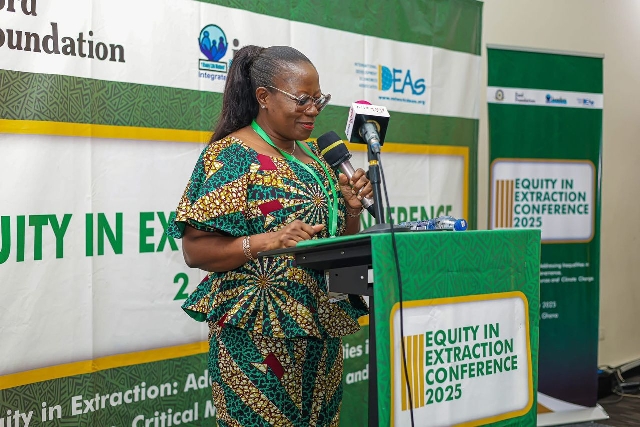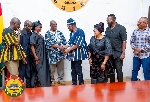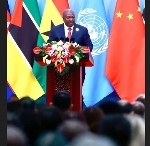NDPC D-G calls for equity and accountability in West Africa’s extractive sector
 Dr. Audrey Smock Amoah
Dr. Audrey Smock Amoah
The Director-General of the National Development Planning Commission (NDPC), Dr. Audrey Smock Amoah, has called for a new era of fairness, transparency, and sustainability in the governance of West Africa’s natural resources.
Delivering the keynote address at the opening of the High-Level West Africa Conference on Equity in Extraction, held in Accra from 14th to 16th October 2025, Dr. Amoah spoke passionately about Africa’s vast resource wealth.
She noted that the continent is richly endowed with minerals such as gold, bauxite, manganese, and diamonds, as well as emerging critical minerals like lithium, cobalt, and nickel.
Citing data from the African Development Bank and the World Bank, she noted that natural resources make a substantial contribution to West Africa’s GDP and export earnings, yet the benefits remain unevenly distributed.
“The irony remains,” she stated, “that those living atop resource-rich lands are often the most marginalised, bearing the brunt of environmental destruction while receiving the least benefit.”
Dr. Amoah referenced His Excellency President John Dramani Mahama’s 2015 address at the Africa Mining Vision Conference in Addis Ababa, where he emphasised that Africa’s natural resources must be a blessing, not a curse.
“We must add value, create jobs, and ensure that our people benefit directly from the wealth beneath our soil,” she reiterated, stressing that this message remains as relevant today as it was a decade ago.
She expressed concern that, according to UNDP studies, only about 15 to 20 percent of mining revenues remain within local economies, a situation that perpetuates inequality and weakens local governance structures.
Using Ghana’s experience with illegal artisanal mining (galamsey) as an example, she highlighted the devastating consequences of poor regulation.
“Our rivers are turning toxic, farmlands are being destroyed, and food crops are contaminated with mercury and other poisonous chemicals,” she warned.
“These environmental and social costs deepen poverty, erode trust in institutions, and widen rural–urban inequality.”
Dr. Amoah underscored that addressing these challenges requires more than economic reforms; it demands moral responsibility and institutional integrity.
“Equity in extraction is not just a technical or economic goal; it is a moral and developmental imperative,” she asserted.
“It means reinvesting revenues from our natural resources back into society, such as schools, hospitals, roads, and decent jobs for our youth.
It means ensuring that women, young people, and local communities are not bystanders but active participants in the extractive economy, from exploration to decision-making and benefit-sharing.”
She further highlighted the importance of environmental stewardship and intergenerational justice, calling for strong legal frameworks, transparent institutions, and accountability at all levels of governance.
To conclude, Dr. Amoah called for deeper collaboration and shared responsibility among governments, private sector actors, and local communities.
She urged West African nations to adopt policies that promote transparency, value addition, and regional cooperation in the management of critical minerals and other natural resources.
In his remarks, Mr. Emmanuel Kuyole, Programme Officer at the Ford Foundation, emphasised that commodity prices, particularly for minerals, are often unstable and subject to long-term decline, making it difficult for communities to fully benefit from extraction activities.
He noted that this price volatility undermines revenue generation, thereby limiting the potential of extractive resources to serve as reliable tools for development.
Mr. Kuyole further observed that extractive industries, except for small-scale agriculture, tend to exacerbate inequality because of their capital-intensive nature, which concentrates wealth and revenues in the hands of a few individuals.
He concluded by stressing that the effective management of revenues and equitable sharing of benefits from extraction can play a crucial role in reducing inequalities.
“When revenues are invested in health, education, and other social services, they can have a transformative impact on inequality. However, this requires strong governance systems and a firm commitment to transparency and accountability,” he stated.
The three-day conference was jointly organised by the Integrated Social Development Centre (ISODEC) and International Development Economics Associates (IDEAs), in partnership with the NDPC. It brought together government officials, civil society actors, development practitioners, private sector representatives, and academics to explore strategies for ensuring that Africa’s natural wealth benefits its people equitably.
Source: Classfmonline.com/Edem Afanou
Trending News

Court discharges Daniel Owusu Koranteng in Ahmed Hussein-Suale murder case
12:10
Education Minister assures public of reforms to address school placement challenges
10:56
Global Leaders’ Meeting on Women: President Mahama details range of initiatives to advance women empowerment
10:29
Speaker urges Ga royal families to unite for development of Greater Accra
15:30
Vice President Naana Jane Opoku-Agyemang attends Global Gateway Forum in Brussels
09:05
Amasaman MP urges youth empowerment through agribusiness development
11:49
W/R: One beheaded, community destroyed in Ahanta West chieftaincy clash
10:43
President Mahama calls for renewed global commitment to gender equality at Beijing summit
08:29
President Mahama directs GETFund to finance Free SHS programme — Education Minister reveals
15:24
Swearing-in of newly selected High Court judges postponed indefinitely
08:28



